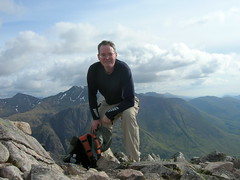Booknotes 2007
Book Ideas
100 Top Books By 100 UW Authors some interesting books by University of Washington authors
Luis Alberto Urrea (From The Week 7 April 2006)
He is the author of The Devil's Highway and Then Hummingbird's Daughter.
He recommends Nobody's Angel by Thomas McGuane, The Stand, Desrt Solitaire, Pilgrim at Tinker Creek by Annie Dillard, THe Essential Haiku by Robert Haas, and The Motorcycle Betrayal Poems by Diane Wakoski. An interesting selection - several I alraady like, so my guess is that there is a fair chance that I will enjoy some of the others he has selected.
Against the Day by Thomas Pynchon - maybe???
Books Read by me
January
Truck: A Love Story (Audio) by Michael Perry
Population - 485 - Meeting Your Neighbors One Siren At A Time (Audio) by Michael Perry
Both of these are about Perry's life in New Auburn, Wisconsin when he returns to his hometown after 12 years of living in the "outside" world.
February
The Singularity Is Near: When Humans Transcend Biology (Hardcover)by Ray Kurzweil
Book Ideas
100 Top Books By 100 UW Authors some interesting books by University of Washington authors
Luis Alberto Urrea (From The Week 7 April 2006)
He is the author of The Devil's Highway and Then Hummingbird's Daughter.
He recommends Nobody's Angel by Thomas McGuane, The Stand, Desrt Solitaire, Pilgrim at Tinker Creek by Annie Dillard, THe Essential Haiku by Robert Haas, and The Motorcycle Betrayal Poems by Diane Wakoski. An interesting selection - several I alraady like, so my guess is that there is a fair chance that I will enjoy some of the others he has selected.
Against the Day by Thomas Pynchon - maybe???
Books Read by me
January
Truck: A Love Story (Audio) by Michael Perry
Population - 485 - Meeting Your Neighbors One Siren At A Time (Audio) by Michael Perry
Both of these are about Perry's life in New Auburn, Wisconsin when he returns to his hometown after 12 years of living in the "outside" world.
February
The Singularity Is Near: When Humans Transcend Biology (Hardcover)by Ray Kurzweil
April
At Dawn We Slept
May
The Last Season by Eric Blehm
Lichens by Wiliam Purvis

